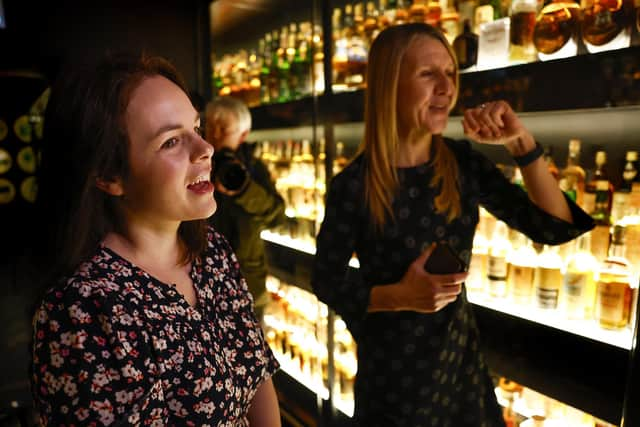Alcohol advertising ban Scotland: Plans face overhaul as controversial consultation closes amid criticism from Kate Forbes and Humza Yousaf
All three SNP leadership hopefuls have indicated they want to rethink the proposals, which have sparked a furious backlash from industry figures. A wide-ranging consultation on the issue closes today.
Ms Forbes said the whisky industry was critical to the Scottish economy and businesses needed to be given “a bit of breathing space”.
Advertisement
Hide AdAdvertisement
Hide AdSpeaking during a visit to the Scotch Whisky Experience on Edinburgh’s Royal Mile on Wednesday, Ms Forbes, the finance secretary, said: “My view is that I do not think we should be banning whisky advertising, full stop.”


Asked about alcohol more widely, she said: "Obviously, the whisky industry is part of the alcohol industry. When it comes to supporting our key industries, I don’t think that we should be banning the advertising of whisky. I think it would be extremely difficult to distinguish between alcohol.”
The MSP for Skye, Lochaber and Badenoch added: “I would not be in support of a ban on alcohol advertising.”
The Scottish Government’s consultation, launched last year, includes plans to ban alcohol sponsorship for both sports and live events. It could also see distillery and brewery shops barred from selling branded merchandise to visitors, as well as drinks branding being removed from pub umbrellas and glassware.
These are ideas rather than concrete proposals. Nicola Sturgeon, the outgoing First Minister, previously said reducing the exposure of children to alcohol advertising was key.
However, industry leaders have raised serious concerns. In a letter published in The Scotsman today, figures in the events sector warn the “collateral damage” of a ban would be events and festivals cancelled, jobs lost and “far-reaching reputational damage”.
Dr Liz Cameron, chief executive of the Scottish Chambers of Commerce, said: “Businesses will welcome Kate Forbes’s comments regarding the potential damage of the proposals contained in the Scottish Government’s alcohol advertising consultation. We have heard widespread feedback from the drinks, whisky and wider food and drink sectors that these measures would make their businesses simply unviable, placing tens of thousands of jobs at risk and damaging the lifeblood of our tourism offering.
“Whoever the next first minister will be, the candidates must urgently confirm that the consultation will be dropped altogether in order to give firms much needed certainty and stability.”
Advertisement
Hide AdAdvertisement
Hide AdEwan MacDonald-Russell, deputy head of the Scottish Retail Consortium, said it was “positive to see the candidates for first minister appear to be learning the lesson from this debacle”. He said: “We hope the new administration will engage fairly with key stakeholders to develop proportional evidence-based interventions which retailers can get behind and which can make a real difference to tackling alcohol misuse amongst the minority who abuse it.”
Whisky expert Blair Bowman also welcomed the comments by Ms Forbes. He said: “I think it’s definitely encouraging that all three candidates are seeing that whisky is such an amazing asset for Scotland, and should be championed and supported in any way possible, rather than constantly shot down, put in the corner and hidden behind the counter, which is what this thing was trying to do.”
A spokesman for the Scotch Whisky Association said: “As we have set out in our response to the consultation, we do have deep concerns regarding the sweeping proposals, which may result in unintended consequences for the industry, tourism sector and wider Scottish economy. We welcome the fact that these concerns are shared by the candidates to be Scotland’s next first minister. Government and industry need to work in partnership to promote moderation and reduce harmful consumption, and we look forward to doing that with the new administration.”
Marc Crothall, chief executive of the Scottish Tourism Alliance, said: “We would hope that this marks the beginning of a significant U-turn on an ill-conceived, high risk government policy which would have inflicted widespread damage and economic self-harm to the very industries which deliver benefits for Scotland’s economy and our communities.”
Humza Yousaf, Ms Forbes’s main rival in the race to become the next first minister, previously indicated he would rethink the consultation. He told the Daily Record: “I’d be minded to withdraw it, but let me make it absolutely clear, with the absolute determination to bring that consultation forward, once again.”
He said it was clear the consultation was causing concern and suggested the Scottish Government needed to better explain its intentions.
Ash Regan, the outsider in the race, has also signalled a rethink. She said: “We need some common sense in the room, for example: the government should not be banning advertising of alcohol in distilleries and their shops. Whisky and gin make up a substantial part of our cultural export sales. The idea tourists wouldn’t be able to see those bottles on shelves in nice advertising is an example of common sense being abandoned.”
Scottish Conservative public health spokeswoman Tess White said: “It’s all very well for Kate Forbes to junk another misguided SNP policy idea, but it can’t disguise the fact that she’s a senior member of a Scottish Government with a failed record in tackling Scotland’s alcohol problem.
Advertisement
Hide AdAdvertisement
Hide Ad“She can’t run away from the fact that she and her colleagues have presided over the highest number of alcohol-related deaths in Scotland since 2008, with policies such as minimum unit pricing failing to prove the panacea we were promised.”
Comments
Want to join the conversation? Please or to comment on this article.
